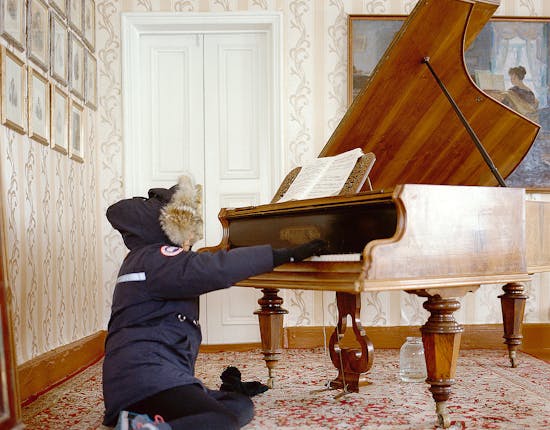Sophy Roberts brings readers on an unconventional hunting expedition — wandering through post-Soviet Siberia seeking pre-Soviet grand pianos. That's her premise in "The Lost Pianos of Siberia," and she means it. Her travels are bold and sociable, and our vicarious pleasure.
Apparently, having exquisite grand pianos schlepped across the Urals or around Cape Horn to snowy manors was an aristocratic prerogative for the high-culture, French-influenced upper-crust denizens of 19th-century Siberia. Post-revolutionary ideology destroyed most of the instruments, and neglect rotted still more. But a few landed in backwater theaters, schools, out on the Yamal Peninsula "in a wooden house with tundra views," and in communized mansions; most gathered dust, and a few were cherished, restored and played.
Quest-travel books are a rich subgenre, and Roberts is indefatigable. She is serious and never ironic about the quest. She loves pianos and pianists but she also loves the stories they bring to light. And she's an ace reporter, mixing with locals and officials, tracking rumors. Her informants become pals. She follows their leads through snow squalls and mosquito swarms. She writes:
"In a small bedroom, Irena introduced me to her mother, who sat on a swivel chair, her feet swinging from the seat like a child's. … Her emptied eyes belying a sharp recollection of detail about the piano she had been given by her aunt, who in 1970 had sent the instrument to Khabarovsk on a train from Tobolsk. 'That piano is the story of my childhood,' said Nina. I took off my coat."
The hunt gives her a mission to push through the hermetic norms of prevailing culture, which mostly obliges her, revealing its secret strength of kindness; her mission and her nature seem fortunately shaped to bring out the best in people.
If the pianos are a bit of an obsession, they're also billets de passage for an extreme version of the kind of gutsy poking-around travel that sometimes happens to those who eschew guided tours and cruise ships. Roberts, asking after pianos, passes through sealed walls, steps in seven-league boots through snowscapes and deep forests and eras into dwellings and lives and memories. She writes:
"I wanted to find more of those people who had allowed me to make trespass into their homes: Russians like … the jazz pianist I met in the Altai, whose rich American rhythms disturbed the snow on his dacha's roof until it slipped off in slabs to the fright of the dog … humble village houses hold stories no one will ever know."
Roberts also undertakes a century-by-century dash through the historic high points of Siberia since Catherine the Great, whose fixation with haute European culture had her court speaking French and piano-makers setting up shop across European Russia and into Siberia. The history is anecdotal, woven through a warp of memories of pianos and people she meets.
She describes the Siberian execution of the deposed, imprisoned czar and family, the forced concerts by virtuosic Gulag prisoners, the post-perestroika revival of Russian Orthodox worship. The stories reveal Siberians' widespread and enduring affection for music.
Roberts reveals herself slowly and is terrific company, our acute, busy, sympathetic and scattered guide. She's always got several plates spinning — dramatic historic anecdotes, emotive narratives about the piano of the moment, the building it's in, the neighborhood's heritage, the parallel adventures of prior literary travelers.
So, it's hardly a history text, more a series of intriguing chats on the human condition with a charming friend excited to share specifics of what she's experienced and discovered. By page 100, I'd settled in, sipping vodka as I read happily on about piano lore, foul-weather adventures, gossipy history, a cast mainly of hospitable locals, and ultimately, as in the best travel books, glad for the fine company of the author.
Mark Kramer, amateur pianist and author of "Travels With a Hungry Bear: A Journey to the Russian Heartland," among other books, founded the Nieman Program on Narrative Journalism at Harvard.
The Lost Pianos of Siberia By: Sophy Roberts. Publisher: Grove Press, 433 pages, $27.




